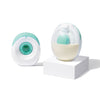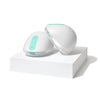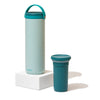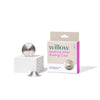The real talk is: There aren’t many mom jobs that are “easy.” And one of the hardest tasks you’ll take on, whether you’re breastfeeding or bottlefeeding is, well, feeding.
Before you became a mom, the prospect of having to feed your kid probably seemed harmless and straightforward. Your baby needs to eat, will get hungry and, therefore, you will provide them with food! But hardly ever does it go that smoothly. There are roadblocks to nearly every feeding endeavor, which can leave you feeling defeated on the regular. Don’t worry! You’ll eventually get the hang of things and get into a feeding groove with your baby—it just might not happen on your expected timeline.
“Feeding is often described as natural, which it is, but that doesn't mean that it will come naturally,” notes Krystyn Parks, MS, RD, IBCLC, founder of Feeding Made Easy. “Both you and your baby are learning a completely new skill together, not to mention the fact that you’re flooded with postpartum hormones, a mix of emotions and a serious lack of sleep,” she says.
The two biggest resources to help you along your feeding journey will undoubtedly be veteran moms and lactation consultants. They’ll be able to give you insider information and the 411 you need to get the job done. Sure, you may have taken a breastfeeding class or two prior to delivery day, but most new moms agree that it’s hard to grasp the realities of feeding prior to your milk actually coming in and your baby latching on.
Parks also points out the fact that there are a lot of myths surrounding feeding, including that it will be painful. “This advice encourages moms to push through the pain, when in reality, they should be seeking out additional help for it,” she notes. “Most moms don't receive any additional care after delivery, so they are left on their own to figure things out using Google and social media to address their concerns.”
But we don’t think you should just suck it up. Here are the things you really need to know about feeding to streamline your experience.

You will feel like a 24 hour drive-thru
Open at all hours, available at any time! You’ll probably want to slap whoever told you that you’d only feed a handful of times throughout the day (did they forget that babies are up all night?!). And you’re probably starting to feel a bit like a milk cow—and one that’s being milked on demand every 20 minutes. And some babies feed more frequently than others.
“A newborn can nurse for 45 minutes, and may eat 8–12 times per day,” notes Parks. “As they get older, they may get more efficient with feeding and decrease the amount of time they are eating, and will also be able to space out their feeds a bit.” For the first few months, Parks recommends finding a good show to watch during feedings, because you’ll be spending a lot of time doing it! Hello, Netflix.
Don’t buy into the hype: you don’t need a freezer stash
Despite what your nursing mom friends may have told you, you don’t need an entire freezer worth of milk in order to successfully breastfeed. In fact, Parks recommends embracing the quote “Feed your baby, not the freezer."
“You really only need about one work day's supply available at any time,” she says. “While you are away, you should be pumping about the same amount that your baby is taking.” If you’re traveling without your baby or you work shifts that require you to be away for more than one day at a time, however, she does recommend creating a larger stash (but still not an entire freezer worth!).
Brush up on your understanding of supply and demand
It’s simple ECON 101. The more demand for milk at the breast and effective removal of milk from the breast (by either your baby or a pump), the greater your milk supply, notes Shelly Patularu, IBCLC and a registered nurse. “By intentionally delaying feeds to reach the 3-hour mark, you could risk decreasing your milk supply—and have a very cranky baby on your hands.”



















